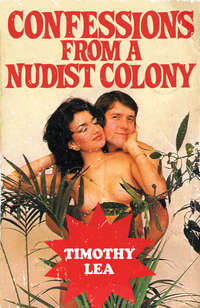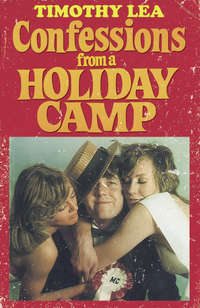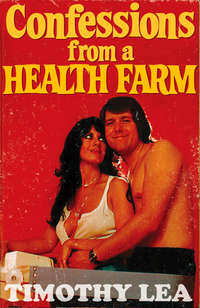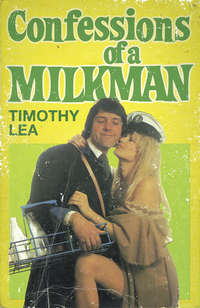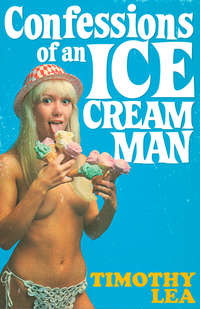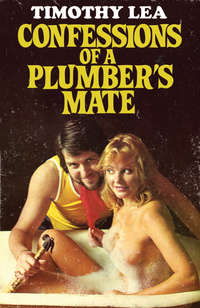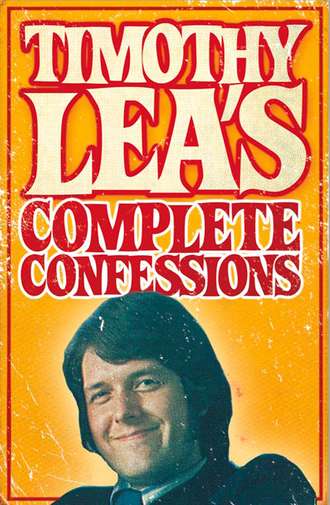
Полная версия
Timothy Lea's Complete Confessions
“You want the camp?” he says.
“Holiday or army?”
“You can have either.”
“I don’t want either, thanks.”
“Python’s, then?”
“Pythons?” I query, my mind boggling.
“Python’s Pesticides. Look, what do you want?”
He seems irritated, as if there are only three reasons for coming to Cromingham in November and he has mentioned all of them.
“15 Ocean Approach, please.”
“Mr. and Mrs. Bendon, isn’t it? You a relation of hers?”
“No. I’m going to lodge with her.”
“Oh, I didn’t think you looked like family. From London, are you?”
“Yes.”
“We don’t get many folk down from London at this time of year.”
“Maybe they don’t like getting the third degree from complete strangers.”
If this ruffles him he doesn’t show it.
“What are you here for?” he says, letting out the hand-brake slowly.
“I’m joining the driving school.”
“You’ve come all this way to learn to drive?”
“Yes. Princess Margaret told me it was the best in the world.”
His expression doesn’t change and he nods his head.
“Which one?”
“The Queen’s sister, of course; which one do you think?”
“I mean which driving school?”
This is a surprise because I hadn’t thought of there being more than one.
“The East Coast Driving School.”
“Oh yes.” He nods his head again and suddenly lapses into silence.
“How many driving schools are there here?” I ask eventually, unable to restrain my curiosity.
“Just the two. The East Coast and the Major.”
“Which one do you reckon is the best?”
“I dunno,” he says, his expression not changing by the flicker of a muscle. “You’d better ask Princess Margaret.”
We are driving along the front now and below me the sea stretches away like cold porridge, only less enticing. The beach has a generous helping of shingle and is divided into sections by an orderly procession of breakwaters disappearing into infinity as if the effect has been achieved with mirrors. I can see one lunatic sitting against a concrete ramp with a thermos flask in his hands, otherwise the beach is as empty as the collection plate at a Jewish wedding. Quite where all the birds that Sid was talking about are I don’t know, but maybe word hasn’t got around that I’m in town yet. We pass a few shelters built in the style of Japanese prefabs and turn off beyond a row of seedy hotels with names that promise rather more than they look likely to deliver. 15 Ocean Approach is one of a row of what must once have been fishermen’s cottages and has a fading ‘Bed and Breakfast’ sign in the parlour window.
‘You’ll be all right there,” says the driver with meaning as he watches me struggle out with my case. “She’ll look after you.”
I pay him and advance towards the front door, which opens as I reach out for the knocker. When I see what I presume to be Mrs. Bendon, I can understand what the driver was getting at. She must be knocking forty and she has a nice pair of knockers to do it with. Her hair has been freshly permed, possibly for my benefit, and she pats it genteelly as she extends a hand.
“Mr. Lea? I thought so. Do come in. Can you manage? Good. Don’t bother about that. I’ll pick it up later. It is cramped in here, isn’t it? Put your case down there. I’ve got the kettle on. Would you like a cup of tea—or coffee, perhaps? Are you sure? It doesn’t make any difference to me. Really it doesn’t. Give me time and I’ll find out all your little likes and dislikes. Did you have a good journey? It’s a drag from London, isn’t it? That change at Norwich and all those stops afterwards. Of course, Norwich is quite a pleasant city. I go and shop there sometimes. Not like London, though. I was born and bred in London, you know. Within the sound of Bow Bells, though I bet you can’t tell it from my accent. Still, I mustn’t ramble on like this. You must be dying for that cup of tea—or was it coffee? It really doesn’t matter, you know. It’s no trouble. You just say what you’d like. I’ll soon get to know all your little likes and dislikes.”
I can’t get a word in, so I take a cup of tea and sit in the front room, listening to her rabbiting on while I look at the horse brasses and the frilly lampshades and the lace headrests and the painting of three horses running into the rising sun, and her legs. Mostly it’s her legs, which are not at all bad for a woman of her age and have a delicious little swelling rising from her thigh which suggest that she is wearing suspenders. Suspenders! The very thought of it sends new life surging through my jockey briefs. Her complexion is good and though she is a trifle on the plump side it suits her. Her teeth are a bit crooked but this must mean that they are her own and I rate that. I’ve never fancied birds who start dismantling themselves at bedtime. The one big disadvantage I can see at the moment is her non-stop rabbiting, which could well get on my nerves over the next few months, or weeks, or days, or hours.
“… so I married him,” she goes on. “There I was with the world at my feet. A pretty girl—though I say it myself—with a good many beaux to my string, and I marry a penniless fisherman after I’ve known him a week. Foolish, romantic chit of a girl that I was.”
I nod understandingly.
“Not that I had anything to complain about—Ted was a wonderfully kind man. He didn’t say much but you always knew he meant well. Never denied me anything that we could afford. But he wasn’t a thinker. We never talked about things. Do you know what I mean?”
I know all right. The poor bastard couldn’t have got a word in edgeways even if he knew any.
“I’d fallen in love with a dream, you see. When he came in on the boat all bronzed and handsome he used to look like some Viking god. He’d leap over the side and thrust the boat up the beach,” Mrs. Bendon bristles at the thought of it, “and his waders would be slapping together, and the fish dancing and the crabs scuttling.” She licks her lips quickly. “I was so proud of him, I wanted to turn to people and say ‘He’s mine.’” Mrs. Bendon’s voice sinks down below the ecstatic level. “But when we were at home he’d just sit staring at the television or go to bed. I never saw him even look at a newspaper. He was a different man. Of course he wasn’t really. He was the same man but it was just the way I looked at him. Do you know what I mean?”
I nod gamely. Of course I do. She wanted a mixture of Oliver Reed and David Dimbleby. Don’t they all?
“Still, that’s enough of me, going on like this. You’ve only been here half an hour and I’m telling you my life story. Must be very boring for you. You’re probably dying to see your room and get unpacked. Would you like a bath after your journey? The trains these days are so dirty, aren’t they? I don’t think anybody ever cleans them. You’d think those diesel things would be cleaner than the old steam ones, but they aren’t.”
My bedroom is at the back of the house and looking obliquely left over a series of tiny back gardens. I can see a chunk of sea between the gap thoughtfully bequeathed by two boarding houses. In the middle of it nestles a small boat and I think of Mr. Bendon. Mrs. B. has not yet told me what happened to him and it’s a bit early to ask. Maybe he was drowned or maybe he couldn’t stand the sound of her voice any more and kept his boat pointed out to sea.
It is cold so I close the window and switch on the electric fire thoughtfully provided. Five minutes later I realise that nothing has happened and notice a small meter which exchanges warmth for 5p pieces. Mrs. B. is not Nelson Rockefeller in drag. I unpack, wash from the rose-patterned china jug and bowl set—idly wondering whether I’m supposed to throw the dirty water out of the window—and lay down on the bed. I’ve almost dozed off when there is a light tap on the door and Mrs. B. tells me that supper will be ready in half an hour and that I can watch the television if I want to.
Her cooking is not bad and certainly better than Mum’s. Mum has trouble reheating a packet of fish and chips.
“That was very nice,” I say, scooping up my last mouthful of fruit salad—the real stuff out of a tin, not Mum’s bits of cut up orange and apple.
“Thank you, dear. I’m glad you liked it. It’s nice to have someone to cook for again. Once the season is over there’s not much doing here and the locals aren’t over-friendly. I’ve lived here twenty years and they still think of me as being an outsider. Of course, there are a lot of new people moving in. Retired couples, most of them, and there is an awful lot of new building—weekend bungalows, that kind of thing. But it’s not easy to make new friends when you’re a single woman of my age. I’m not a newcomer and I’m not really a resident either. People seem to be at bit suspicious. If you’re not married it’s difficult to fit in, you know.”
I get my nod working again.
“Tell you what,” I say. “Why don’t I help you with the washing up and then take you out for a drink? There must be a nice little pub near here.”
“That’s very kind of you, dear, but what will the neighbours say? Going out with the lodger on his first night. Tongues will be wagging.”
“They don’t have to know, do they?”
“There’s not much that goes on around here they don’t know about. All right, just a quick one. I haven’t been out in the evening for weeks and I think I deserve a little tipple. We’ll take my car.”
“I didn’t know you had a car.”
“Oh, it’s very old. One of the first A40s ever made. I keep it in a garage round the corner. I hope it will start. There isn’t anywhere very nice to drink around here and I’d like to get away from the neighbours.”
By the time we get out it is dark as the inside of a nigger’s nostril and the wind is playing havoc with Mrs. B.’s carefully-tarted-up hair. There is a bit of movement behind the neighbouring curtains and I can believe what she says about them not missing much. You can almost hear the tongues tuning up.
Getting the car out is a bit of a pantomime because there is no light in the lock-up garage and I have to fumble about with controls that might belong to an electric organ for all I can see. Mrs. B. flaps and fusses and when the bloody engine eventually fires into life you would think I’d built it from toothpicks the way she goes on.
“Ooh, what talent,” she squeals. “You won’t mind if I ask you to fix a few things at home, will you?”
“Pleasure,” I say. “Now, which way do we go?”
We tootle inland for about six miles and this gives me time to get acquainted with the perfume she is wearing. It’s the kind that comes at you like the North Korea Army and I think she laces it with chloroform because I am quite drowsy by the time we get to a small country pub with some water glittering in the background. I nip out smartish so I have the satisfaction of opening her door and watching her skirt ride up as she climbs out. Long as I live, I’ll never tire of watching birds get in and out of cars. It’s the little casual things that turn me on more than five hours of strip-tease.
“It’s lovely here in the summer time,” she says. “All kinds of boats. Have you ever been on the Broads?”
I’m a bit slow to answer because most of the time she doesn’t expect you to. Besides, I don’t know what she is on about. I always thought that a ‘broad’ was the American word for a woman and I don’t think she means that.
“The Broads, dear,” she explains. “They’re lakes connected by rivers. You can sail for hundreds of miles, or take a cabin cruiser, or fish. Surely you’ve heard of them?
Now that she mentions it, I do remember Dad going on about how he came up here once with a party of his mates when he was a lad. I didn’t take any notice because I reckoned anything he did must be pretty square and wasn’t worth touching with a barge pole.
“Oh, yes,” I say, “my family came up here once. My father was very impressed. Now, which bar do you recommend?”
Inside there is a big log fire burning and a few old codgers playing dominoes in the corner. They look at us like they’ve never seen another human being before, but after examining every thread of clothing eventually go back to their game as we settle by the fire.
“You’d better not offer to do this too often, otherwise you’ll have no money left,” says Mrs. B., raising her glass of whisky gratefully. I agree with her but I don’t say so.
“It’s my pleasure. The very least I could do after that wonderful meal.”
Smarmy creep, aren’t I? But it’s only common sense to keep on the best side of your landlady. But how far should I go? If it was anyone else I’d be trying to get my hand up her skirt already; but I have to live with her. If she takes it the wrong way or we get too involved, it could be disastrous. I’d better bide my time till I see how the land lies—or the landlady lies.
“You’re looking very preoccupied,” she says. “A penny for your thoughts.”
“I wasn’t thinking about anything really—apart from how lucky I am to be staying with you, of course. No, I think I must be a bit tired. I’m feeling quite drowsy.”
“Not surprising after your journey. It’s probably the air, too. Very bracing, Norfolk air, but it takes it out of you. I’ll buy you one and then we’d best be getting back. There’s not a lot of time before they close, anyway.”
I protest but she is very persistent and in the end she slips me 50p and we have another one.
“Have you got any children?” I ask in one of our quiet moments—these occur when she stops talking to get her breath back.
“Yes. One. She’s at Teacher Training College at the moment. She’ll be home at Christmas. She’s a lovely girl, though I say so myself. You’ve got her bedroom.”
“I hope that’s not going to inconvenience you when she comes home?”
“No, she can move in with me. It won’t hurt her for a couple of weeks.”
“Is that all the holiday she gets?”
“No, but she has lots of friends and she is always going to stay with them. They come here in the summer, though it’s a crush putting them all up.”
I look forward to seeing Miss Bendon and the thought preoccupies me on the way back.
To my surprise Mrs. B. does not get out before we approach the garage but sits there while I open up and edge forward into the tight little nest of darkness. I switch off the engine and the silence is deafening.
“Well,” she says wistfully, “that was very nice.” I can feel her turning her face towards me and I don’t need a handbook to tell me what I am supposed to do next.
“Yes. Very snug little place, that,” I gulp. I’m tempted My God, I’m tempted, but I try to remember my resolution of earlier in the evening. Mrs. B. sighs and puts her hand on the door handle.
“Ah well, I suppose we’d better go home before someone wonders what we’re doing in here.”
“Yes.” I try a light laugh and hop out gratefully. Sitting beside Mrs. B.’s warm, perfume-doused body and listening to the noise her stockings make as they rub together is more than a young boy should be expected to stand.
We walk home in silence and Mrs. B. lets me in. and pauses at the foot of the stairs.
“Would you like Ovaltine or something?”
“No, thanks. I think I’ll turn in. I’m feeling really sleepy now.”
Mrs. B. puts her hand on my arm.
“Breakfast will be about eight. I’ll give you a call. Thanks again for taking me out. I did enjoy it.”
“It was nothing. Really nothing.” I drop my head and give her a quick kiss on the cheek as if the idea had just flown into my mind and been too overpowering to resist. “I’m sorry. I just felt I had to do that. I don’t know what came over me. Sorry.”
I make this speech stumbling up the stairs and at their foot Mrs. B. is gazing at me with what seems like tears in her eyes—or maybe it is the light.
“You’re a funny boy,” she says, blowing me a kiss. “Sleep tight.”
“Good night.”
I scarper across the landing and gratefully close my bedroom door behind me. Not bad, really. Enough done to save my honour and keep Mrs. B. simmering gently, without risking upsetting the apple cart on my first trip to market.
I undress and get into bed and then have to get out again and wedge some paper into the window jambs to stop their persistent rattle performing a Norfolk version of the Chinese water torture. The wind threatens to lift the house off the ground and the sea sounds mean and angry and coming from the next room. Considering I am living in the middle of a town it is amazing how quiet it is otherwise. No cars, no drunks, no Ngoblas extending hospitality Ghanian-style to about 500 guests.
Thinking about home makes me sad again. I imagine Dad dropping off in front of the little white light in the middle of the T.V. screen, and Mum carefully marking up tomorrow’s viewing in the T.V. Times before feeding the goldfish and putting the cat out.
Cromingham seems a long way from all that.
CHAPTER FOUR
The next morning finds me outside the East Coast Driving School, which is situated in a small glass-fronted shop next to the Majestic Cinema and sllightly larger than it. The cinema is showing ‘The Big Sleep’ and the familiar faces of Bogart and Bacall, sneering at me from the faded stills, are comforting. “Yeah, he’s the kind of guy who would bat all your teeth out, then kick you in the stomach for mumbling.” “O.K., blue eyes, where’s Schultzy? Talk or I’ll give you a row of lead waistcoat buttons.” I turn up my coat collar, stuff my hands deep into the pockets and walk past the E.C.D.S. offices again. I have done this about six times now and the shapely blonde manicuring her nails behind a desk marked RECEPTION is beginning to notice me. She is wearing a silk blouse unbuttoned provocatively so the top of her bra cups show and she is either chewing gum or trying to ease out a stubborn piece of breakfast that doesn’t want to say goodbye to her teeth. She looks a greedy girl and I am prepared to bet that her appetite covers more than a taste for Black Magic chocolates. Besides her, the room contains half-a-dozen chairs and a test-your-eyesight wall chart. It looks like a doctor’s waiting-room.
It is five past nine so I square my enormous shoulders and stroll nonchalantly into the reception area, pausing only to remove the doormat which has hooked itself over one of my shoes.
“Yes?” says the girl, looking at me as if I am something the cat has brought up. “Can I help you?” She manages to make it sound like it is the last thing in the world she wants to do.
“I hope so,” I say. “My name is Lea and I have an appointment with Mr. Cronk at nine o’clock.”
“And you’re five minutes late for it, aren’t you, lad?” The voice belongs to an enormous man with a moustache like one of those things used for cleaning toilets.
He has appeared through a door marked PRIVATE and his bloodshot eyes are going up and down my body like they’ve been caught up in the zip of my fly.
“One thing I can’t abide is unpunctuality,” he goes on. “I saw you slouching up and down outside. Having second thoughts, were you? Or was it the lure of the moving picture house? No joy there, because it’s bingo two-knee-ite.” His voice rises to a shrill screech at the end of the sentence and the word ‘night’ is pronounced as in ‘knee height to a grasshopper.’ His inflection is about as army as a set of mess tins and my steel trap mind springs to a conclusion.
“Mr. Cronk?”
“Key-rect, Lea. Step into my office.”
I go through the door marked PRIVATE and into a neat little rooms which contains a desk, empty except for a set of ‘in’, ‘out’ and ‘pending’ trays, all of which are also empty. On the wall is a picture of Montgomery and a few other geezers who have cleaned up, selling their memoirs to the Sunday Times. Slightly to the left of them is a photograph of Cronk amongst a group of regimental hard nuts posed under a palm tree as if they have just won something—probably World War II.
“Right, lad,” says Cronk, sitting down behind his desk, but making no gesture towards waving me into a seat. “Welcome to the East Coast Driving School. You will find us a happy band united behind the resolve to make this the most successful driving school in the whole of East Anglia. I think I can safely say that already our reputation has spread far and wide and we intend to build on success. That is why you are fortunate to be joining us at a moment when the future looms wide with opportunities. With your assistance, we will take them.”
“Thank you,” I say earnestly. “You can rely on me to do my best.”
“I hope so, lad. I know nothing about you apart from what your brother-in-law wrote to me.” I look questioningly into his face but it doesn’t tell me anything. “I expect you heard that we were involved in a little altercation?”
I nod. “You got him thrown out of the army.”
“Yes, indeed. Terrible business. Mistake. Awful.”
“You don’t want to worry about it,” I reassure him. “Sid was dead chuffed to be out.”
“Nevertheless,” Cronk winces at such blasphemy, “it was a bad business and I hold myself responsible. The least I can do is to extend a helping hand to you as some kind of reparation. But, and let me make this most clear, this is not a charitable organisation. You will be expected to pull your weight and if you do not come up to our standards—high standards, I might add—we will be forced to dispense with your services. Understood?” I nod again. “Now, as I expect you know, one-fifth of all your instructing time must be spent with an A.D.I. until you pass your examination and I’ve asked our Mr. Cripps to accompany you on your first few lessons. He’ll take you out for a tour of the most used test circuits after our little chat.”
‘Chat’ is the wrong word, for Cronk doesn’t give me the chance to say anything. He rabbits on about the importance of not compromising myself and the penalty for ignoring his advice—instant dismissal. Though disturbed by his attitude, I’m cheered to find that there obviously is the chance of a bit of nooky if you keep your eyes open.
I keep nodding and wish I could get a bit of activity into my facial muscles to relieve the monotony, but I can feel my features setting like cement.
“… and so, now that you know a little about us …” I can tell that he is winding up for the big finale, “… and in the weeks to come you’re obviously going to know a great deal more. If there is anything you’re not happy about, anything you want to know, come and see me; that’s what I’m here for. Understood? Good. Any questions?”
“Yes,” I think to myself. “One. Why do you wear that bloody great moustache when you have a small, turned-up nose with a red blob on the end of it like Coco the clown? That moustache needs a great big hooter with a beard in the middle of it.”
“Not at the moment, thank you.” I shake my head and unravel my fingers.
“Right. I’ll introduce you to Mr. Cripps.”
He presses a button in the middle of his desk and nothing happens. He does this twice more and then stalks to the door and siezes the knob as if intent on tearing it from its mooring. Seconds later I realise that this was not his intention because he is looking at the knob in his hand with something akin to surprise. Cursing crudely he seeks the spindle, but this has dropped through to the other side. I find the whole situation a mild giggle but Cronk has turned scarlet and dropping to his knees begins to bellow instructions through the keyhole. These are speedily complied with—possibly too speedily because the returning spindle makes violent contact with Cronk’s eyeball causing him to cry out with pain and anger.
“Are you trying to blind me?” he howls, as the door is opened. “Do you realise there could have been a very serious accident? When is somebody going to do something about that bleeper? I’d be better off with a megaphone. Oh my God, this place is going to the dogs.”
“The man said he’d come yesterday,” says the receptionist who is totally unmoved by the outburst. “Do you want me to see if he can fix the door handle as well?”
“Yes, please,” says Cronk making an obvious effort to control himself. “I’d be very grateful if you would. Now, can you ask Mr. Cripps if he would be kind enough to step inside my office as I’d like to introduce him to Mr. Lea.”


